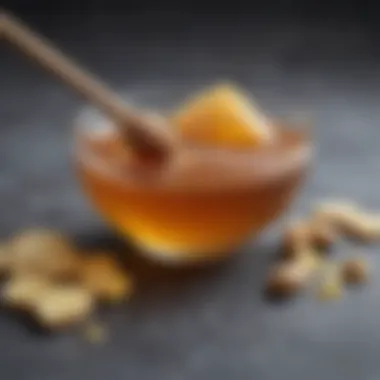Homemade Recipes to Relieve Sore Throat Discomfort


Intro
A sore throat can be not only uncomfortable but also indicative of underlying health concerns. Various home remedies have emerged as practical solutions to soothe that unwelcome pain. Utilizing everyday ingredients, these homemade recipes often provide relief without exclusions of extensive preparation methods. As we delve into this topic, it's important to examine not just traditional remedies but also innovative approaches that could enhance healing. This exploration aims to weave together simplicity, accessibility, and efficiency, armed with knowledge of effective homemade antidotes.
Recipe Overview
- Soothing Honey-Garlic Syrup
- Yield: 8 servings
- Prep Time: 10 minutes
- Cook Time: 30 minutes
- Difficulty: Easy
- Main Ingredients: Honey, Garlic, Ginger, Lemon, Water
This warm syrup marries the beneficial properties of raw honey, revered for its soothing characteristic, with the medicinal qualities of garlic. The added zest of ginger and lemon enhances flavor, turning a simple concoction into a compelling remedy against throat discomfort.
Step-by-Step Instructions
- Prep Ingredients:
- Combine Ingredients: In a saucepan, add the chopped garlic, grated ginger, lemon juice, honey, and water.
- Cook: Bring the mixture to a gentle boil over medium heat. Reduce to low heat and let it simmer for about 30 minutes.
- Cool: Once cooked, remove from heat and let it cool. Strain the mixture into a clean jar, discarding the solid bits.
- Store: Keep the syrup refrigerated. It lasts for up to two weeks.
- Peel and finely chop 4 cloves of garlic.
- Grate 1-inch piece of ginger.
- Juice 1 lemon.
- Measure out 1 cup of honey and 3 cups of water.
This syrup not only soothes but also offers nutritional benefits, enhancing immunity while alleviating throat pain.
Nutritional Information
- Calories per Serving: Approximately 45 calories
- Breakdown:
- Highlights:
- Proteins: 0.1g
- Fats: 0.1g
- Carbohydrates: 12g
- Honey: Contains antioxidants, supports healing.
- Garlic: Known for anti-inflammatory properties and boosting immune function.
- Ginger: Provides digestive support and aids muscle relaxation.
Quick Cooking Tips
- Utilize a slow cooker if you're looking to prepare larger batches over time. Set it on low for 4 to 6 hours, allowing the ingredients to merge harmoniously.
- In case fresh ginger is not available, ground ginger can serve as a viable substitute, albeit with a more concentrated flavor.
- Cook each ingredient incrementally to yield timeliness in preparation while also optimizing flavor release.
Related Recipes & Variations
- Herbal Tea with Lemon and Honey: Utilizing the same ingredients provides a warming hass similar benefits down ot elleviating throat pain.
- Chamomile Infusion with Ginger: This can be an intriguing twist for additional parameters of cocooning hydration when sick.
- Adaptations: You can modify for vegan audiences by substitute regular honey with almond or maple syrup, allowing accessibility without compromising values.
All in all, exploring homemade solutions brings culinary enthusiasm into the broader context of personal well-being. Sharing variations or personal recipes among project definitions furthers community engagement and health literacy.
Preamble to Sore Throat Remedies
Sore throat discomfort can significantly hinder daily life. It reduces the capacity to communicate, eat, and even sleep soundly. Understanding sore throat remedies is crucial for both immediate relief and long-term health during cold seasons. This article narrows in on effective homemade solutions that can be made with everyday ingredients. They often offer additional benefits apart from alleviating pain.
Understanding Sore Throat Symptoms
A sore throat typically presents itself with various symptoms. Common indications include:
- Scratchy sensation at the back of the throat
- Pain during swallowing
- Redness and swelling in the throat area
- Possible fever and chills
- Swollen lymph nodes in the neck
These symptoms may vary in intensity and can signal underlying infections or other ailments. Recognizing these symptoms is half the battle. By acknowledging them early, one can start implementing effective remedies to potentially ease the discomfort.
The Role of Homemade Remedies
Homemade remedies have long been a go-to source for various illnesses, especially sore throats. This practice not only connects people to wholesome ingredients but can also provide quick relief with minimal effort. Utilizing items at home reduces dependency on over-the-counter medications, which often come with unwanted side effects.
The ingredients for these remedies are typically easy to procure. Many are already in your kitchen. Honey, ginger, lemon, and apple cider vinegar are noted for their soothing properties. Whether used alone or combined, they act effectively to treat the discomfort of a sore throat.


Key Ingredients for Sore Throat Relief
When addressing sore throat, understanding the key ingredients that provide relief is critical. Methods for soothing discomfort often revolve around accessible items that are known for their beneficial properties. Ingredients such as honey, ginger, lemon, and apple cider vinegar have long been praised for their natural capabilities to alleviate symptoms. This section will delve into each of these ingredients, highlighting their specific benefits and considerations for use.
Honey: A Natural Soothing Agent
Honey is far from just a sweet addition to beverages; it stands out for its multiple health benefits. Rich in antioxidants, honey not only enhances flavor but also helps to coat the throat, reducing irritation.
- Types of Honey: Local raw honey is a versatile option. Darker varieties may offer more antioxidants.
- Usage: Honey can be taken alone, or blended with warm water or lemon for added effectiveness.
- Precaution: It’s important to note that honey should not be fed to infants under the age of one due to the risk of botulism.
Overall, incorporating honey into your remedies could provide that extra layer of comfort and relief during discomfort.
Ginger: Nature's Anti-Inflammatory
Ginger is revered for its health-promoting properties, particularly its anti-inflammatory effects. With its warming nature, ginger root offers a citrusy eventually with an earthy undertone, serving not just as a flavor enhancer but as a healing agent, especially for sore throats.
- Health Benefits: Ginger has been used in traditional medicine for generations to soothe nausea and reduce inflammation. Its compounds like gingerol can help suppress inflammation at a cellular level.
- Preparation: To harness its benefits, ginger can be steeped in hot water to create an effective tea or grated and used fresh in food.
- Caution: While generally safe, high doses may lead to digestive issues for some individuals. Therefore, moderation is key.
Utilizing ginger in homemade remedies can provide significant relief, contributing to overall feeling better during an illness.
Lemon: Boosting Immunity and Flavor
Lemon is a powerhouse of vitamin C, which is crucial when battling illnesses such as a sore throat. In addition to offering a bracing taste, lemons can stimulate the immune system, aiding in quick recovery.
- Antibacterial Properties: The citric acid present in lemons may help to balance pH levels in the throat, potentially decreasing the growth of bacteria.
- Combining Ingredients: Mixing fresh lemon juice with honey can amplify both flavor and healing. Furthermore, lemon in either warm water or tea can soothe the throat.
- Environment Factors: Take note that excessive consumption may cause dental erosion, which makes moderation necessary. After ingestion, it’s helpful to rinse the mouth with water.
In essence, lemon not only boosts flavor but fortifies the body's defenses against infection.
Apple Cider Vinegar: Antimicrobial Properties
Apple cider vinegar is noted for its antimicrobial function, working effectively as a natural antiseptic. Acetic acid, a main component, can help fight bacteria and disperse mucus.
- Dilution Importance: Direct consumption is harsh; instead, it is recommended to dilute apple cider vinegar in a glass of water before drinking.
- Additional Ingredient Compatibility: Combining apple cider vinegar with honey or lemon can enhance efficacy early on in an illness.
- Health Considerations: People with chronic conditions such as diabetes should consult healthcare professionals regarding its use.
Incorporating apple cider vinegar into your regime could offer added advantages in managing a sore throat.
For many, understanding these ingredients marks the first step to creating effective homemade remedies that provide solace and enhance well-being.
Simple Homemade Remedies for Sore Throat
Understanding how to effectively soothe a sore throat is valuable. Simple homemade remedies can provide relief without needing prescription medications. They often combine readily available ingredients which can offer both comfort and healing. Engaging in these remedies can also establish a deeper connection between culinary practices and health. The benefits extend beyond alleviating discomfort; they encompass the empowerment of managing personal health through cooking.
Warm Honey Lemon Drink
This drink is a staple for sore throat relief. Honey has natural antibacterial properties while lemon provides a dose of vitamin C, assisting in boosting immunity. The warm water soothes irritation in the throat.
Preparation is quite straightforward:
- Boil water and let it cool slightly to prevent burning your throat.
- Squeeze the juice of half a lemon into a cup.
- Add 1-2 tablespoons of honey to taste.
- Pour the cooled water into the cup and stir well.
- Sip it slowly while it’s warm.
Regular consumption of this drink can help alleviate throat discomfort significantly. It’s comforting and provides a warm embrace during illness.
Ginger Tea with Honey
This combination is more than just a drink; it features ginger's anti-inflammatory properties and honey’s soothing attributes. Ginger aids in reducing throat inflammation. Combined with honey, this teas promote healing.


How to prepare it:
- Peel and slice about an inch of fresh ginger.
- Boil it in two cups of water for 10-15 minutes to créat a ginger infusion.
- Strain the pieces away.
- Stir in honey according to personal taste preference.
- Let it cool slightly before drinking.
Drinking this tea can become a ceremonial break for relaxation. It’s beneficial for overall comfort and well-being.
Salt Water Gargle
Another effective remedy is salt water gargle. It creates an environment that is inhospitable for bacteria and viruses, while also providing temporary relief from swelling in the throat. It’s one of the simplest methods to implement.
Steps for a typical gargle:
- Dissolve half a teaspoon of salt in a glass of warm water.
- Take a sip but do not swallow, then gargle for about 30 seconds.
- Spit out the water.
- Repeat the gargle several times a day as needed.
This method is effective in managing discomfort and encourages the reduction of inflammation. Those seeking fast relief will find this option particularly appealing.
These simple remedies not only provide immediate relief but can also support longer-term throat health.
By embracing these or another key home staple, individuals can address throat issues effectively while steeping in culinary traditions. Avoiding complicated preparations makes these remedies suitable for everyone, including those with minimal kitchen experience.
Innovative Blends for Sore Throat Relief
Innovative blends for sore throat relief bring together powerful ingredients known for their soothing properties. These combinations not only enhance flavor but also provide individual and synergistic benefits to well-being. Homemade blends often emphasize natural options that can be easily created in one's kitchen, making them accessible to all. Each ingredient plays a specific role in soothing throat discomfort, combating inflammation, or providing antimicrobial effects, showcasing the versatility of culinary creativity in addressing health concerns.
Turmeric and Ginger Honey Paste
Turmeric is a spice recognized for its anti-inflammatory properties. Combined with ginger and honey, it forms a paste that is quite effective against sore throat symptoms. The warmth of ginger is calming, while turmeric offers curcumin, which lowers inflammation. Honey not only adds sweetness but also soothes the throat, creating a harmonized mix. To prepare this paste, just mix equal parts of grated turmeric and ginger. Add honey until it reaches a paste-like consistency. This blend can be ingested directly or used as a topping on toast, making it a simple yet effective way to take advantage of its remedies.
Basil and Honey Infusion
Basil is often overlooked in sore throat remedies, yet it possesses anti-inflammatory and antimicrobial traits. Infusing it with honey creates a delicious solution. Begin by steaming the basila leaves in hot water for about ten minutes to release their medicial oils. After straining, add honey to the warm liquid. The infusion can be taken as tea, providing both mental comfort and effective throat soothing. Basil’s aromatic quality elevates the experience, making this specific blend easy to drink while gaining all the benefit for the throat.
Cinnamon and Honey Mixture
Cinnamon has antioxidant and anti-inflammatory properties, making it a fitting partner for honey. This mixture offers warmth and relief ideal for sore throats. Combining they offer a palatable option that evokes familiarity and comfort. To create this mixture, blend one part cinnamon powder with two parts honey. Stir until trouhgly combined, producing a thick syrup. This can be consumed by the spoonful or incorporated into hot beverages like tea. Cinnamon adds a robust flavor profile and completes the blend with the known therapeutic effect against throat discomfort.
Understanding the benefits of innovative blends is key to managing symptoms effectively. Use these preparations when you wish natural solutions that align with both taste and remedy in home care.
Dietary Considerations During Sore Throat
Understanding what to consume when experiencing a sore throat is crucial for effective self-care. The right dietary choices can significantly impact recovery. Foods can ease symptoms and boost overall healing. Also, consistency in diet during this period can aid in maintaining strength and well-being.
When dealing with a sore throat, it is essential to choose foods that soothe irritation and prevent further discomfort. Additionally, some foods should be avoided to prevent exacerbation of symptoms or irritation. Attention to these dietary considerations helps in managing the discomfort associated with sore throats.
Foods to Eat for Soothing Effect
Several foods and drinks can provide soothing effects. These can help to lubricate and reduce inflammation. Some effective options include:
- Warm broths: Chicken or vegetable broth can be very comforting. They offer hydration and nourishment without causing irritation.
- Herbal teas: Teas like peppermint or chamomile can be very soothing. They reduce throat irritation and may provide mild anti-inflammatory properties.
- Applesauce: It is easy to swallow and generally non-irritating, making it a good choice.
- Greek yogurt: Rich in protein and probiotics, this food aids digestion. Moreover, its smooth texture is gentle on the throat.
- Bananas: Soft and easy to swallow. Also, they are rich in vitamins and minerals that support immune function.
- Honey: Used in teas or directly, honey acts as a natural-soothing contrast to sore throat pain. Its antimicrobial properties may also assist in reducing infection.
Incorporating these foods regularly can be beneficial during a sore throat.
Foods to Avoid
Certain foods can worsen symptoms or contribute to further irritation. Avoiding these is essential for effective self-care:


- Spicy foods: They can lead to increased irritation and discomfort.
- Citrus fruits: While they can be healthy, they may cause a burning sensation on an already irritated throat.
- Crunchy snacks: Chips or raw vegetables can create abrasions in the throat. Choose softer options instead.
- Dairy products: For some, they may create away that thickens mucus. This can lead to increased discomfort.
- Caffeinated beverages: These can cause dehydration. Since staying hydrated is crucial, they should be limited.
Avoiding these foods helps to promote a more comfortable recovery environment. Consideration of the right choices makes the healing process smoother and more efficient.
Choose wisely for a speedier recovery. A gentle diet is essential when facing a sore throat.
Additional Tips for Sore Throat Management
When dealing with a sore throat, the remedies you apply through cooking are only part of the picture. Managing a sore throat effectively requires a comprehensive approach, including proper self-care strategies, consideration of physical well-being, and, when necessary, professional medical advice. These additional tips can enhance the comfort you feel and possibly speed up recovery.
Maintaining Hydration
Hydration is crucial when experiencing sore throat discomfort. Fluids help to keep your throat moist and alleviate irritation. Opt for warm fluids like herbal teas, effectively soothing your throat pain. Others prefer sipping warm water mixed with apple cider vinegar for additional benefits, including antimicrobial support.
Ways to maintain hydration:
- Drink at least eight glasses of water daily.
- Try to include herbal teas that can be calming.
- Consider broths or soups, which provide hydration alongside nutrients.
Using hydration diligently can keep your throat’s tissues supple and promote healing more efficiently.
Rest and Recovery
Rest is another pillar when handling a sore throat. The body requires time to heal, and sleep is essential for recovering immune function. During periods of illness, listen to your body's signals. Take breaks, avoid overexerting yourself, and allow your body to focus on restoration. Avoiding stressful activities aids comprehension, letting your mind and body recover.
Here are some rest tips for effectiveness:
- Prioritize a sleep schedule—seven or eight hours are preferable.
- Reduce screen time, especially before bed. This may help you fall asleep faster.
- Don’t hesitate to take naps during the day if you feel particularly fatigued.
Consultation with Healthcare Professionals
Should your sore throat persist or you notice severe symptoms such as difficulty swallowing or breathing, consulting a healthcare professional becomes important. They can determine the underlying cause and whether any specific treatments are necessary.
Reasons to consider consultation include:
- Persistent symptoms beyond 5-7 days.
- High fever accompanying sore throat.
- Severe pain that limits your ability to eat or drink.
Remember, timely intervention can prevent complications while ensuring a smoother recovery, as self-diagnosis may neglect underlying issues. Always prioritize your health and do not shy away from seeking help when necessary.
"A proactive approach in management leads to more effective health outcomes. Review all aspects of your recovery, including hydration, rest, and wise consultation."
The End
Summarizing the Benefits of Homemade Remedies
Homemade remedies can be powerful allies in the fight against sore throats. Utilizing pantry staples like honey, ginger, and lemon not only provide relief but also enhance overall health. These ingredients have been time-tested for their natural soothing properties. Making these remedies is simple, affordable and allows the user to control what goes into their bodies. Each recipe crafted with care can contribute to comfort during an uncomfortable time.
The benefits extend beyond mere symptom relief; they include added nutritional support. For instance, honey offers anti-inflammatory** benefits, while ginger combats nausea and boosts immunity. Furthermore, lemon's high vitamin C content fortifies the immune system. By opting for homemade solutions, individuals have the liberty to experiment with:
- Flavors
- Ingredients
- Potency
This makes it easier to tailor remedies to specific taste preferences or dietary restrictions. Such adaptability is particularly useful when illness affects appetite. Homemade approaches encourage observation of how certain ingredients work, helping people to listen to their bodies more effectively.
Encouragement for Exploration in Cooking
Engagement in the kitchen does not just serve practical purposes; it activates personal creativity. Whenever faced with discomfort from a sore throat, solving that problem through cooking can be empowering. Understanding the function of each ingredient cultivates a more profound appreciation for, and relationship with, food.
Trying out these recipes could also lead to further culinary adventures. Who knows, a passionate exploration might evolve into something larger—perhaps a greater interest in nutrition, culinary skills, or even holistic wellness practices. Start simple; blend different disinfectant herbs or play with sweeteners to find preferred elevations in taste.
Additionally, cooking while unwell can become a form of self-care, allowing individuals to nurture and comfort themselves. Overall, exploring cooking while focusing on healing merges practical dietary actions with personal growth, transforming a mere task into a meaningful experience.
We can use food not just for survival but also to thrive during challenging times. The kitchen exists as a sanctuary to explore flavors, creativity, and nourishment.







